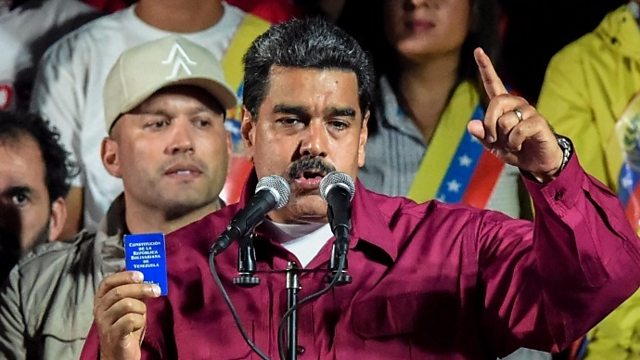

CARACAS, Venezuela (AFP) — President Nicolas Maduro is calling on Venezuelans to return home and “stop cleaning toilets” in other countries as Brazil sends troops to the border with its crisis-ridden neighbour.
According to the United Nations, some 1.6 million Venezuelans have fled the country since 2015 as four years of recession, hyperinflation and a collapsing economy have left millions destitute.
“I’m telling Venezuelans … who want to return from economic slavery: stop cleaning toilets abroad and come home to live in your homeland,” said Maduro in a live address on television and radio on Tuesday evening as he signed petroleum agreements.
The far-left leader hit out at the “racism, contempt, economic persecution and slavery” that Venezuelans following “the songs of sirens” have encountered in Peru.
Venezuela put on a chartered airplane to bring 89 citizens back home from Peru on Monday. Peru says more than 400,000 Venezuelans fleeing poverty and economic meltdown are living in the country.
“They longed to return to their homeland to receive the embraces of their friends, neighbours, companions, relatives and the human warmth that we Venezuelans know how to share,” added Maduro.

His broadside at the treatment of Venezuelans in Peru comes at a time when Brazil is sending troops to its border following a violent attack by locals earlier this month drove 1,200 migrants back across the border.
An angry mob in Brazil’s northwestern Roraima state rampaged through a makeshift migrant camp following rumours a local shopkeeper had been brutally beaten by Venezuelans.
Brazil President Michel Temer said the troop deployment, something which was done already 10 days ago just after the violence broke out, was aimed at providing “security for Brazilian citizens but also Venezuelan immigrants fleeing their country.”
Temer didn’t specify how many soldiers would be sent but 10 days ago it was a small contingent of just 120.
Ahead of a meeting between 13 Latin American countries organized by Ecuador next month to discuss the Venezuelan migrant crisis, Brazil’s move suggested a hardening of attitudes towards Maduro’s regime.

Temer called on “the international community to adopt diplomatic measures” to halt the “tragic” exodus of Venezuelans that “threatens the harmony of practically the entire continent.”
But he added, ominously: “Brazil respects the sovereignty of other states but we have to remember that a country is only sovereign if it respects its people and looks after them.”
Maduro has branded the exodus as a “right-wing campaign” and says he’s sure the migrants will return to take part in the country’s rebuilding following his raft of reforms aimed at breathing life into Venezuela’s dying economy.
Industry is operating at just 30 percent, hyperinflation is predicted by the International Monetary Fund to reach one million percent this year and oil production, on which Venezuela is almost entirely dependent, has dropped to a 30-year low of 1.5 million barrels a day, according to the Organization of Oil Producing Countries, compared to it’s record high of 3.2 million 10 years ago.
The UN says 2.3 million Venezuelans out of a population of 30.6 million are living abroad, many in nearby countries such as Peru, Ecuador and Chile, as well as neighbours Colombia and Brazil.
Reforms include increasing the minimum wage by 3,400 percent, redenominating the currency — removing five zeros — that was also devalued by 96 percent and fixed to the value of Venezuela’s largely discredited cryptocurrency, the petro.
There’s also been an increase in the value added tax (VAT) and reduced gasoline subsidies — Venezuelans pay the lowest prices in the world for fuel — as well as a new tax on remittances sent home from foreign-based citizens.
They have failed to convince locals, though.
“It’s a disaster, we don’t have basic foods. The measures are pure lies, they’ll bring more hunger and unemployment,” 34-year-old doctor Marielsi Ochoa told AFP.
Experts also doubt these reforms will stem the tide of immigrants.
“How can ordinary people remain in Venezuela with massive food shortages, medicines and medical care virtually unavailable, jobs scarce or badly paid, schools without teachers, escalating crime rates and no signs of relief?” said Peter Hakim, president emeritus and a senior fellow at the Inter-American Dialogue think-tank.























